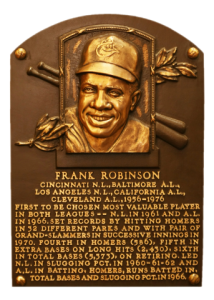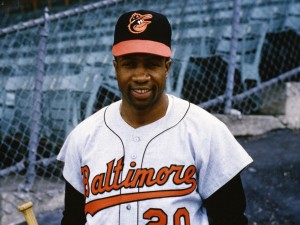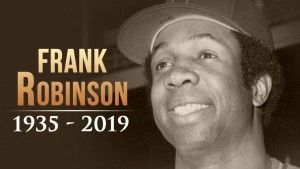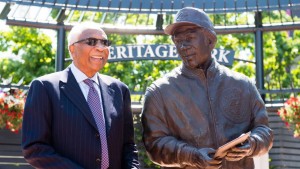There are many apt descriptions of the late Frank Robinson, who passed away last week. The one that comes to mind most for me is the single most underappreciated member of the Baseball Hall of Fame.
The reasons for this are complex. They begin with when he played. Robinson came up in 1956 with the Cincinnati Reds and had an immediate impact, winning the National League (NL) Rookie of the Year award. It was also the first of two consecutive years starting for the NL in the All-Star game.
He would never start another All-Star game for the NL.
For the better part of his remaining years in the NL, the honor was reserved for the Giants’ Willie Mays, the Braves’ Hank Aaron, and/or the Pirates’ Roberto Clemente. Robinson, though a perennial All-Star, was the odd man out along with the Cubs’ Billy Williams. Add the Yankees’ Mickey Mantle to the fray, and Robinson always found his greatness in the shadow of others.
And even before breaking into professional baseball, Robinson was in the shadow of others. His high school basketball teammate was one William Felton “Bill” Russell, who only would become the single greatest winner in team sports history. Several scouts actually thought that Robinson was better than Russell.
I suspect another aspect to Robinson’s under-appreciation was the simple fact that he did not believe in taking any sh*&&^% from anybody. In 1961, Robinson was constantly receiving racist threats. So, he decided to buy a gun. When a man made such a threat toward him in a restaurant, Robinson showed the gun and was arrested for carrying a concealed weapon. Insult to injury was that no one from the Reds management bothered to come to his aid. So, he spent the night in jail.
Be it Frank Robinson in 1961 or Marissa Alexander in 2010, when we, as Black folks attempt to stand our ground, we go to jail!
 But such injustices never seemed to dissuade Robinson. In fact, they seemed to only give him more resolve. For example, he went on to win the first of two MVP awards in 1961. From a mental standpoint, he may have been the toughest hitter in baseball history. He crowded the plate, knowing full well that contemporary pitching intimidators such as Don Drysdale and Bob Gibson would hit him. As a result, he led the league in being hit by a pitch 6 times.
But such injustices never seemed to dissuade Robinson. In fact, they seemed to only give him more resolve. For example, he went on to win the first of two MVP awards in 1961. From a mental standpoint, he may have been the toughest hitter in baseball history. He crowded the plate, knowing full well that contemporary pitching intimidators such as Don Drysdale and Bob Gibson would hit him. As a result, he led the league in being hit by a pitch 6 times.
Gibson, a Hall of Famer in his own right, said this about Robinson, “As a rule, I’m reluctant to express admiration for hitters, but I make an exception for Frank Robinson”.
After the 1965 season, the Reds ownership decided that Robinson was an “old 30” and traded him to the Baltimore Orioles.
It was, and still is today, one of the most impactful trades in baseball history.
The Orioles were already an up and coming team. Robinson put them over the top. In 1966, Robinson would win the Triple Crown (leading the league in homers, RBIs, and average), and both the American League (AL) and World Series MVP, as the Orioles would sweep the defending champion Dodgers in four games. The MVP award made him the only player in history to win the award in both leagues, and he still is today. Injuries to Robinson and a young pitching phenom named Jim Palmer would limit the Orioles’ success in 1967-68. But once healthy again from 1969-1971, and with the addition of southpaw pitcher Mike Cuellar, the Orioles would go on to average 106 wins over the next 3 seasons and win another World Series in 1970 over his former team, the Reds. For whatever reason, the Orioles traded Robinson after the 1971 season and dropped to 80 wins in 1972.
the Triple Crown (leading the league in homers, RBIs, and average), and both the American League (AL) and World Series MVP, as the Orioles would sweep the defending champion Dodgers in four games. The MVP award made him the only player in history to win the award in both leagues, and he still is today. Injuries to Robinson and a young pitching phenom named Jim Palmer would limit the Orioles’ success in 1967-68. But once healthy again from 1969-1971, and with the addition of southpaw pitcher Mike Cuellar, the Orioles would go on to average 106 wins over the next 3 seasons and win another World Series in 1970 over his former team, the Reds. For whatever reason, the Orioles traded Robinson after the 1971 season and dropped to 80 wins in 1972.
Robinson would end his career with 586 home runs, but to truly appreciate this, once again one must understand the era in which Robinson played. It was during the golden age of dominant pitching. In 1956, the National League only had 8 teams and they all used a 4-man pitching rotation. Unlike today’s 5-man expansion diluted rotations, every team had good pitching. Over the next ten years, Robinson would face the Braves’ Warren Spahn, the Phillies’ Robin Roberts, the Cardinals’ Gibson, the Giants had both Juan Marichal and Gaylord Perry, and the Dodgers had Drysdale and Sandy Koufax. In other words, the Cubs and Pirates were the only two teams that did not have a future Hall of Fame pitcher or pitchers at the top of their rotation.
By the time he got to the AL, expansion had begun to dilute pitching. Nevertheless, most teams still had high-level pitchers at the top of their rotations. The Indians had Louis Tiant, the Tigers had Denny McClain and Mickey Lolich, the Twins had Jim Perry and Bert Blyleven, the A’s had Catfish Hunter and Vida Blue, the White Sox had Wilbur Wood, the Yankees had Mel Stottlemeyer, the Angels and Rangers would eventually acquire Nolan Ryan and Ferguson Jenkins. When he returned to the American League in 1973, he had to face his former Orioles teammates in Palmer, Cuellar, and Dave McNally. Every pitcher noted is either a Hall of Famer, or at the very least, a multi-year All-Star, or 20 game-winner over their careers. Pitching was so dominant that the league decided to lower the mound after the historical 1968 season, to try to help hitters.
This is the backdrop of Robinson’s offensive accomplishments. It was the equivalent of what Pedro Martinez was able to do as a pitcher, at the height of the steroid era. Robinson was not feasting off 4th and 5th starters who struggled to get through 5 innings.
Robinson was the first Black manager in baseball history and though his record was sub-.500, so too was his talent. There are two years that make the case for him being a better manager than the record may indicate. After management decided to trade away the entire starting rotation, led by perennial All-Star Vida Blue, Robinson led the Giants to 87 wins in 1982.
In 1988, after an 0-6 start, Robinson took over the Baltimore Orioles, who would go on to lose its first 21 games, which is still a record to start the season. That team would only win 54 games. The next year, without a dramatic roster overhaul, the Orioles won 87 games under Robinson’s leadership, and he would win the AL Manager of the Year award.
But his managerial success would always fade, no doubt due at least in part to his personality. Robinson was never shy about his lack of interest in making friends. Furthermore, like Ted Williams, I am not sure how understanding or encouraging one of the games great players can be of a struggling .202 hitter.
There is something profoundly sad about a person who seemingly must die before getting his/her flowers. I am not sure if Robinson much cared if it had no bearing on winning. If you look in the baseball dictionary by the term “Old School”, there will be a picture of Frank Robinson, and I doubt that he would have it any other way.
Rest in Peace!
Gus Griffin, for War Room Sports
Tags: All's Fair in Sports and War, American League, Baseball, Frank Robinson, Gus Griffin, Manager, MLB, MVP, National League, War Room Sports, WRS


